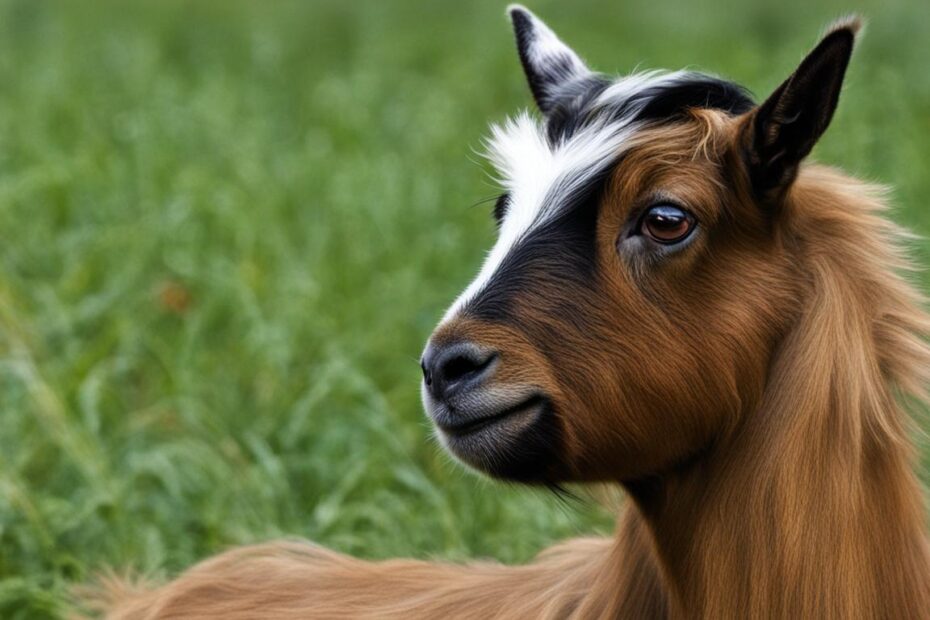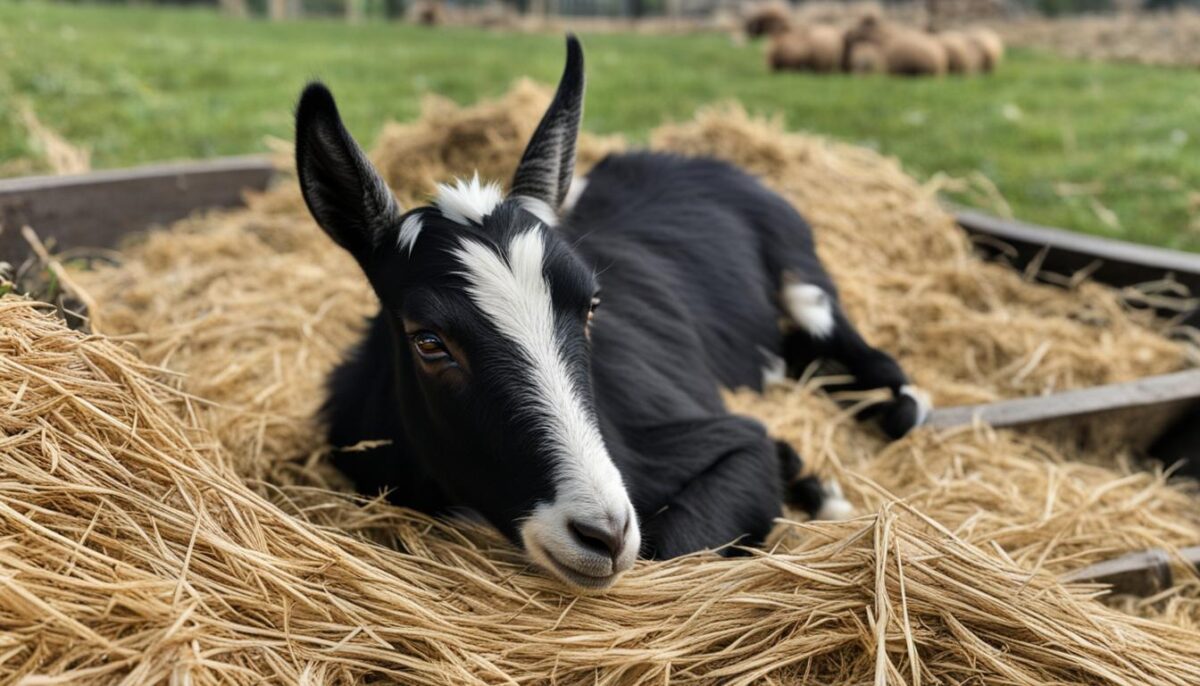Have you ever wondered why a Nigerian Dwarf goat may suddenly pass away without any apparent cause? In this article, we will delve into the mysterious phenomenon of sudden goat deaths and explore one common cause: enterotoxemia. Understanding the factors that contribute to the sudden death of Nigerian Dwarf goats is essential for goat owners to take preventive measures and ensure the well-being of their beloved animals.
Key Takeaways:
- Enterotoxemia, also known as overeating disease, is a common cause of sudden death in Nigerian Dwarf goats.
- Changes in diet or overeating can cause an overgrowth of bacteria in the intestines, leading to the production of toxins that damage the organs and result in death.
- Early symptoms of enterotoxemia include lethargy, loss of appetite, pain, diarrhea, and neurological signs.
- Prevention through proper herd management, vaccination, and gradual dietary changes is crucial in avoiding enterotoxemia.
- Regular veterinary care and vaccinations are essential for the overall health and well-being of Nigerian Dwarf goats.
Causes and Risk Factors of Enterotoxemia in Nigerian Dwarf Goats
Nigerian Dwarf goats are prone to various health issues, and one of the most common and concerning is enterotoxemia, also known as sudden goat death syndrome. Understanding the causes and risk factors associated with this condition is crucial for goat owners in order to prevent its occurrence and protect the health and well-being of their animals.
Enterotoxemia in Nigerian Dwarf goats is primarily caused by sudden changes in their diet or overeating. When goats are introduced to large amounts of fresh grass or grain too quickly, or when kids consume excessive amounts of milk, it can disrupt their digestive system and lead to the overgrowth of bacteria, particularly Clostridium perfringens types C and D. Other risk factors for enterotoxemia include poor herd management practices, lack of vaccination, improper feeding practices, heavy parasite loads, and weakened immune systems.
To prevent enterotoxemia in Nigerian Dwarf goats, it is essential to implement proper herd management practices. This includes making dietary changes slowly and gradually to allow the goats’ digestive system to adjust, feeding a balanced diet, and avoiding sudden excesses of grain or lush grass. Vaccination with CD/T toxoid, which protects against Clostridium perfringens types C and D as well as tetanus, is highly recommended. Good hygiene practices, such as keeping feed storage areas clean and secure, also play a significant role in preventing enterotoxemia.
| Risk Factors | Prevention Measures |
|---|---|
| Poor herd management | Implement proper herd management practices |
| Lack of vaccination | Vaccinate goats with CD/T toxoid |
| Improper feeding practices | Make dietary changes gradually and feed a balanced diet |
| Heavy parasite loads | Regularly deworm goats |
| Weakened immune systems | Ensure goats have proper nutrition and veterinary care |
By being aware of the causes and risk factors associated with enterotoxemia in Nigerian Dwarf goats, goat owners can take proactive steps to prevent this condition and safeguard the health of their animals. Implementing proper herd management practices, including gradual dietary changes, vaccination, and regular veterinary care, can significantly reduce the risk of enterotoxemia and promote overall goat health and well-being.
Symptoms of Enterotoxemia in Nigerian Dwarf Goats
Enterotoxemia, also known as overeating disease, can cause sudden death in Nigerian Dwarf goats. It is essential to recognize the symptoms of this condition to ensure prompt veterinary care and increase the chances of successful treatment. The symptoms of enterotoxemia can vary but often include:
- Lethargy
- Loss of appetite
- Pain
- Diarrhea
- Neurological signs such as head extension and convulsions
These symptoms can progress rapidly, and in some cases, the goat may be found dead without any prior signs of illness. Monitoring goats closely for any changes in behavior or appetite is crucial. If any symptoms of enterotoxemia are observed, seeking veterinary care immediately is essential to improve the goat’s chances of survival.
It is important to note that the symptoms mentioned above may also be indicative of other health issues. Therefore, it is crucial to consult a veterinarian for an accurate diagnosis and appropriate treatment.
“The prompt recognition and treatment of enterotoxemia is crucial in preventing the loss of Nigerian Dwarf goats. Any signs of illness should never be ignored, and immediate veterinary care should be sought to ensure the well-being of these animals.”
Prevention of Enterotoxemia in Nigerian Dwarf Goats
Preventing enterotoxemia in Nigerian Dwarf goats is crucial to avoid the sudden death of these animals. Proper herd management and vaccination play a significant role in minimizing the risk of enterotoxemia. By implementing best practices and taking preventive measures, goat owners can protect their herds and ensure their well-being.
Proper Dietary Management
- Make dietary changes gradually to allow the goats’ digestive system to adjust.
- Avoid sudden excesses of grain or lush grass, as this can trigger enterotoxemia.
- Feed a balanced diet that meets the nutritional needs of Nigerian Dwarf goats.
Vaccination
Vaccination is crucial for protecting Nigerian Dwarf goats against enterotoxemia. The CD/T (Clostridium perfringens Type C and D and Tetanus) toxoid vaccine is recommended for all goats, including does, bucks, and kids. Consult a veterinarian for a proper vaccination schedule and administration techniques.
Good Hygiene Practices
- Keep feed storage areas clean, secure, and free from contamination.
- Practice good hygiene when handling feed and water to prevent the spread of bacteria.
- Provide clean and fresh water to goats at all times.
Regular Veterinary Care
Regular veterinary care is essential for the overall health and well-being of Nigerian Dwarf goats. A veterinarian can provide guidance on nutrition, vaccination, and parasite control. They can also perform routine health checks and identify any underlying health issues. Prompt veterinary care can help prevent or manage enterotoxemia effectively.
By following these preventive measures and maintaining a proactive approach to goat health, goat owners can significantly reduce the risk of enterotoxemia and ensure the longevity of their Nigerian Dwarf goat herds.
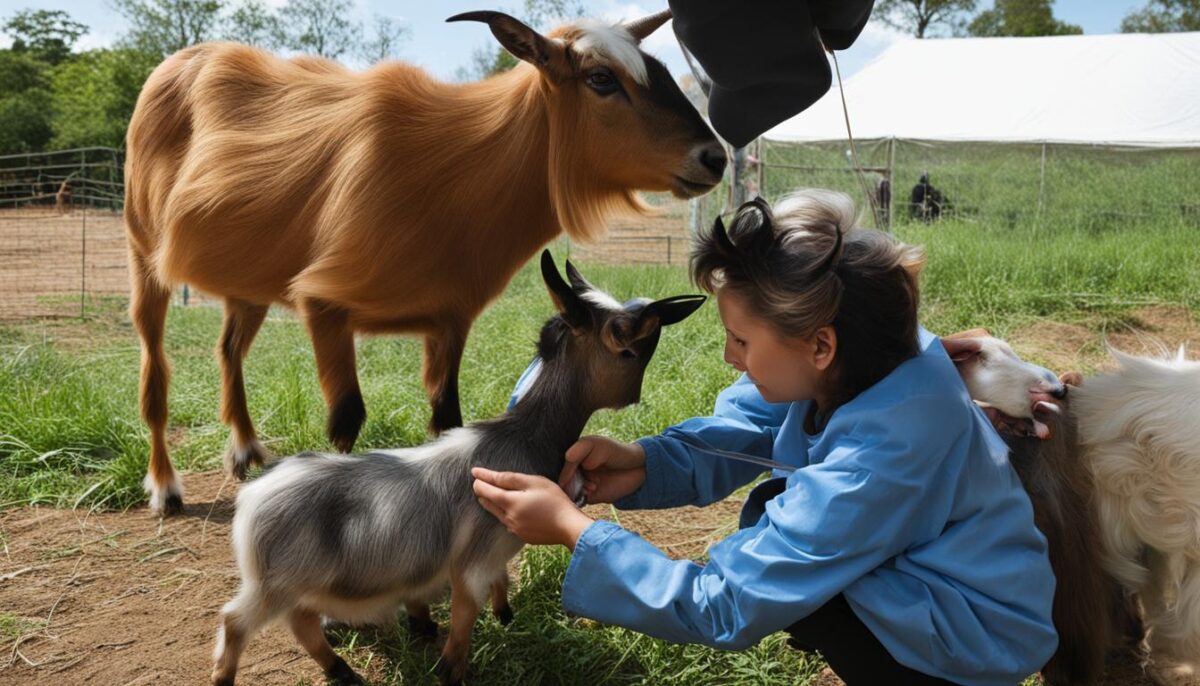
Treatment of Enterotoxemia in Nigerian Dwarf Goats
The treatment of enterotoxemia in Nigerian Dwarf goats can be challenging, especially when symptoms have become severe. Early detection is crucial to increase the chances of goat recovery. Veterinarians may recommend providing supportive care, such as intravenous fluid therapy, pain relief, and administration of CD/T antitoxin and antibiotics. However, it is important to note that enterotoxemia can progress rapidly, and treatment may not always be successful. Thus, prevention is the best approach to avoid the loss of Nigerian Dwarf goats to enterotoxemia.
Enterotoxemia prevention strategies include proper herd management and vaccination. Goats should be introduced to dietary changes gradually to allow their digestive system to adapt. Feeding a balanced diet and avoiding sudden excesses of grain or lush grass can also help prevent enterotoxemia. Vaccination with CD/T (Clostridium perfringens Type C and D and Tetanus) toxoid is recommended for all goats, including does, bucks, and kids. Good hygiene practices, such as keeping feed storage areas secure and clean, can further contribute to preventing enterotoxemia.
Table: Treatment and Prevention of Enterotoxemia in Nigerian Dwarf Goats
| Treatment | Prevention |
|---|---|
| Supportive care | Proper herd management |
| Intravenous fluid therapy | Gradual dietary changes |
| Pain relief | Feeding a balanced diet |
| Administration of CD/T antitoxin and antibiotics | Vaccination with CD/T toxoid |
While treatment can help mitigate the effects of enterotoxemia, prevention remains the most effective strategy. By implementing proper herd management practices, such as gradual dietary changes and vaccination, goat owners can significantly reduce the risk of enterotoxemia in Nigerian Dwarf goats. Regular veterinary care is crucial in maintaining goat health and addressing any potential health concerns promptly. Monitoring goats for changes in behavior or appetite and seeking veterinary care at the first signs of illness are essential for the well-being of Nigerian Dwarf goats.
Other Possible Causes of Sudden Death in Nigerian Dwarf Goats
While enterotoxemia is a common cause of sudden death in Nigerian Dwarf goats, there are several other factors that could contribute to unexpected loss in these animals. It is important for goat owners to be aware of these potential causes to ensure the well-being and health of their herds.
Variety of Causes
Sudden death in Nigerian Dwarf goats may result from various conditions, including:
- Hypocalcemia – a deficiency of calcium in the blood that can lead to severe muscle spasms and ultimately, death.
- Clostridial diseases – such as blackleg and malignant edema, which are caused by certain bacteria and can lead to tissue destruction and sepsis.
- Electrocution – accidental electrocution from faulty wiring or exposed power sources.
- Asphyxiation – can occur if a goat becomes trapped or entangled in fencing, equipment, or other objects.
- Monensin poisoning – a toxic reaction to a commonly used feed additive.
- Ruminal acidosis – an imbalance of acidity in the rumen, a goat’s first stomach, which can be caused by sudden dietary changes or excessive consumption of grain.
- Chronic copper poisoning – ingestion of excessive levels of copper, often from contaminated feed or water.
- Pneumonia – a respiratory infection that can quickly become severe and cause death if left untreated.
- Bloat – a buildup of gas in the rumen, usually caused by rapid ingestion of fermentable carbohydrates.
It is worth noting that necropsy examination – a postmortem examination of the animal’s body – is often necessary to determine the exact cause of sudden death in Nigerian Dwarf goats.
| Cause | Description |
|---|---|
| Hypocalcemia | Deficiency of calcium in the blood leading to muscle spasms and death |
| Clostridial diseases | Bacterial infections causing tissue destruction and sepsis |
| Electrocution | Accidental death caused by exposure to electrical current |
| Asphyxiation | Death due to being trapped or entangled |
| Monensin poisoning | Toxic reaction to a feed additive |
| Ruminal acidosis | Imbalance of acidity in the rumen caused by dietary changes or excessive grain consumption |
| Chronic copper poisoning | Ingestion of excessive levels of copper |
| Pneumonia | Severe respiratory infection |
| Bloat | Buildup of gas in the rumen |
The sudden death of Nigerian Dwarf goats can be caused by various factors other than enterotoxemia. Goat owners should remain vigilant, implement proper herd management practices, and seek veterinary assistance to minimize the risk of unexpected loss in their herds.
Importance of Regular Veterinary Care for Nigerian Dwarf Goats
Regular veterinary care is essential for maintaining the health and well-being of Nigerian Dwarf goats. A veterinarian plays a critical role in providing guidance on proper nutrition, vaccination schedules, parasite control, and overall herd management. Through routine health checks, a veterinarian can identify any underlying health issues and provide appropriate treatment.
Veterinary care is especially crucial in preventing diseases such as enterotoxemia. By closely monitoring the goats’ health and behavior, a veterinarian can detect any signs of illness early on and take necessary preventive measures. Prompt veterinary care can significantly increase the chances of a goat’s recovery and prevent the further spread of infectious diseases within the herd.
Additionally, regular veterinary visits help ensure that Nigerian Dwarf goats receive the proper vaccinations. Vaccines, such as the CD/T toxoid, provide long-term immunity against diseases like enterotoxemia and tetanus. Following the recommended vaccination schedule, as advised by a veterinarian, helps protect the health and well-being of Nigerian Dwarf goats.
In conclusion, regular veterinary care is crucial for Nigerian Dwarf goats to maintain their health and prevent the occurrence of diseases. By partnering with a veterinarian, goat owners can ensure that their goats receive proper nutrition, timely vaccinations, and necessary treatment. This proactive approach promotes the overall well-being of Nigerian Dwarf goats and reduces the risk of health problems within the herd.
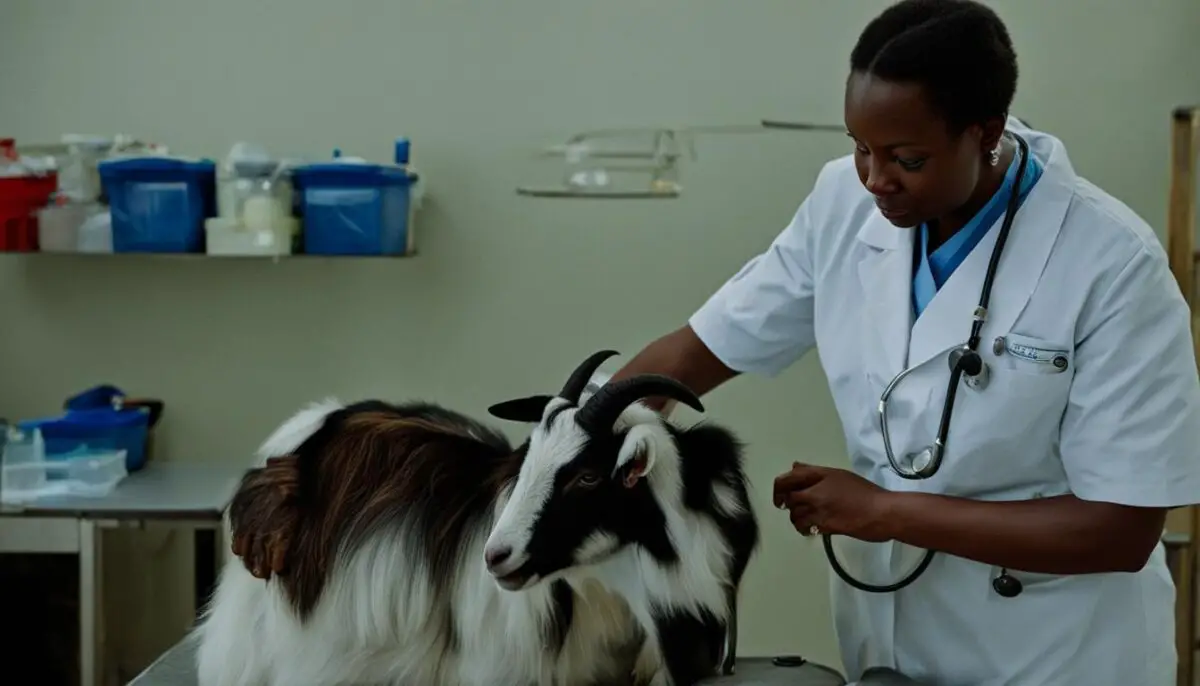
Herd Management Practices to Prevent Disease in Nigerian Dwarf Goats
Implementing proper herd management practices is crucial for preventing diseases in Nigerian Dwarf goats. By following these practices, goat owners can significantly reduce the risk of health issues and ensure the well-being of their herds. Here are some key herd management practices to consider:
- Maintain clean and secure feed storage areas: Proper storage of feed helps prevent contamination and the growth of harmful bacteria, reducing the risk of diseases like enterotoxemia.
- Provide access to fresh and clean water: Clean water is essential for the overall health and hydration of the goats. Ensure that water sources are regularly cleaned and replenished.
- Regular deworming: Parasite control is crucial for preventing diseases in goats. Regular deworming helps keep parasite loads low and reduces the risk of illnesses.
- Ensure adequate shelter and ventilation: Goats need a sheltered and well-ventilated environment to protect them from extreme weather conditions and respiratory issues. Provide proper bedding and ensure proper ventilation in the shelter.
- Separate sick or newly acquired goats: Isolating sick or newly acquired goats from the rest of the herd can help prevent the spread of infectious diseases. This practice helps protect the overall health of the herd.
- Regular monitoring of health and behavior: Careful observation of the goats’ health, body condition, and behavior is crucial for early detection of any health issues. Regular check-ups and monitoring can help identify and address potential problems before they become severe.
By implementing these herd management practices, goat owners can create a healthier environment for Nigerian Dwarf goats and minimize the risk of diseases such as sudden goat death syndrome. Ensuring proper nutrition, regular veterinary care, and a stress-free environment are also vital for the overall well-being of the goats.
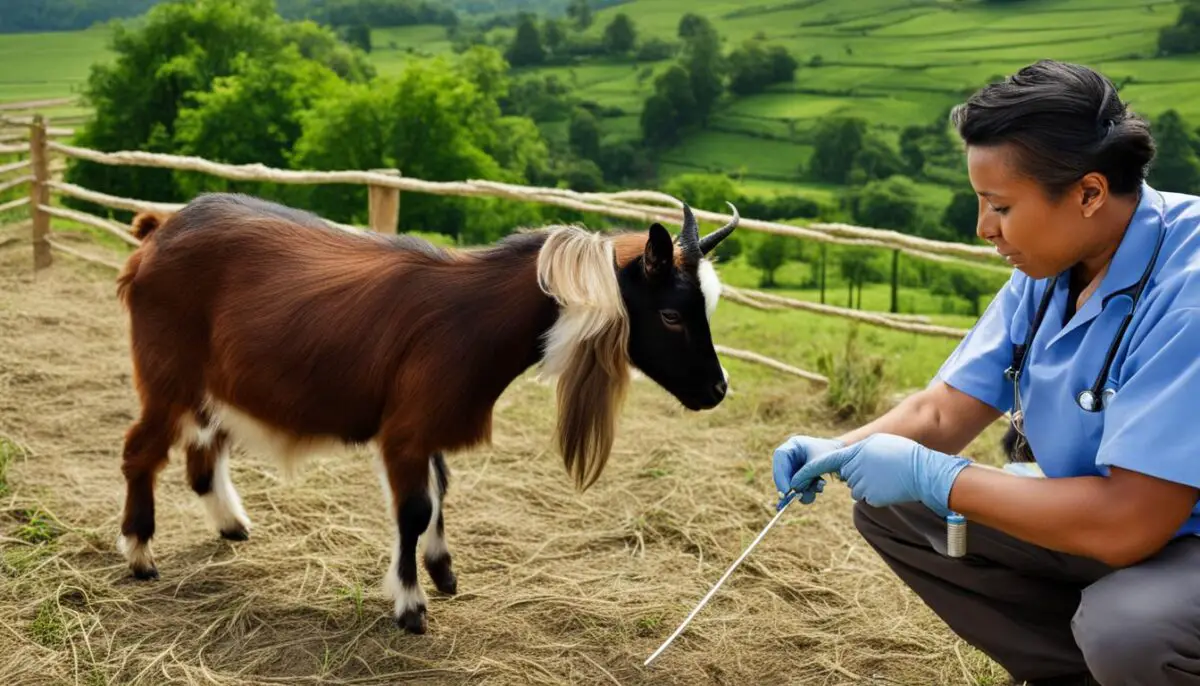
Vaccinating does, bucks, and kids is important in preventing the transmission of diseases and minimizing the risk of illness within the herd. Does should be vaccinated pre-breeding and pre-kidding to ensure the transfer of antibodies to the kids. Bucks should also be vaccinated to prevent the spread of diseases to the herd.
Vaccination is a preventive measure that helps reduce the incidence of diseases and can save goats’ lives. It is important to consult with a veterinarian experienced in goat health to determine the appropriate vaccines for your Nigerian Dwarf goats. Veterinarians can provide guidance on vaccination schedules and administer the vaccines to ensure proper dosages and administration.
Benefits of Vaccinations for Nigerian Dwarf Goats:
- Protection against diseases: Vaccinations help protect Nigerian Dwarf goats from various diseases, including enterotoxemia, tetanus, and others mentioned in this article.
- Improved herd health: Vaccinated goats are less likely to contract and spread infectious diseases, leading to improved overall herd health.
- Reduced mortality rates: Vaccinated goats have a lower risk of illness and death, reducing losses for goat owners.
- Cost-effective: Vaccinations are a cost-effective way to prevent diseases and avoid costly treatments and losses associated with illness.
- Peace of mind: Keeping up with vaccinations provides peace of mind for goat owners, knowing that they have taken proactive steps to protect their goats’ health.
Regular vaccinations are an essential aspect of Nigerian Dwarf goat veterinary care. By ensuring that goats are properly vaccinated, owners can help prevent the occurrence and spread of diseases, ultimately promoting the health and well-being of their goats.
Conclusion
The sudden death of a Nigerian Dwarf goat can be a heartbreaking experience for goat owners. However, understanding the underlying causes can help prevent future losses. One common cause of sudden goat death is enterotoxemia, which is triggered by sudden dietary changes or overeating. The bacteria Clostridium perfringens, particularly types C and D, can rapidly multiply in the goat’s intestines, producing toxins that damage vital organs.
Preventing enterotoxemia requires proper herd management and vaccination. Gradual dietary changes, balanced nutrition, and avoiding sudden excesses of grass or grain can help prevent the onset of the disease. Vaccinating goats with CD/T toxoid provides long-term immunity and safeguards against enterotoxemia and tetanus. Regular veterinary care, including health checks and early detection of any symptoms, is crucial for maintaining the well-being of Nigerian Dwarf goats.
While enterotoxemia is a common cause, there are other potential causes of sudden death in Nigerian Dwarf goats, such as hypocalcemia, clostridial diseases, electrocution, and pneumonia. Conducting necropsies can help determine the exact cause of death and enable appropriate preventive measures. By implementing proper herd management practices, vaccinations, and regular veterinary care, goat owners can significantly reduce the risk of unexpected deaths in their Nigerian Dwarf goats.
FAQ
What is enterotoxemia, and why is it a common cause of sudden death in Nigerian Dwarf goats?
Enterotoxemia, also known as overeating disease, is a condition caused by the bacteria Clostridium perfringens. It can lead to sudden death in Nigerian Dwarf goats due to the toxins produced by the bacteria damaging the intestines and organs.
What are the symptoms of enterotoxemia in Nigerian Dwarf goats?
Symptoms of enterotoxemia include lethargy, loss of appetite, pain, diarrhea, and neurological signs such as head extension and convulsions.
How can enterotoxemia in Nigerian Dwarf goats be prevented?
Enterotoxemia can be prevented through proper herd management practices, including slow and gradual dietary changes, vaccination with CD/T toxoid, and good hygiene practices.
What is the treatment for enterotoxemia in Nigerian Dwarf goats?
Treatment for enterotoxemia in Nigerian Dwarf goats is often challenging. Supportive care, such as intravenous fluid therapy and pain relief, may be provided. Administration of CD/T antitoxin and antibiotics may also be recommended by a veterinarian.
Are there any other possible causes of sudden death in Nigerian Dwarf goats?
Yes, other possible causes of sudden death in Nigerian Dwarf goats include hypocalcemia, clostridial diseases, electrocution, asphyxiation, poisoning, pneumonia, and bloat.
How important is regular veterinary care for Nigerian Dwarf goats?
Regular veterinary care is crucial for maintaining the health and well-being of Nigerian Dwarf goats. A veterinarian can provide guidance on nutrition, vaccination schedules, parasite control, and overall herd management.
What herd management practices can help prevent disease in Nigerian Dwarf goats?
Good herd management practices include maintaining clean feed storage areas, providing clean water, regular deworming, and ensuring adequate shelter and ventilation. Separating sick or newly acquired goats can also prevent the spread of infectious diseases.
How important are vaccinations for Nigerian Dwarf goats?
Vaccinations, such as CD/T toxoid, play a crucial role in preventing diseases in Nigerian Dwarf goats. Following a proper vaccination schedule recommended by a veterinarian is important.
What should I do if my Nigerian Dwarf goat dies suddenly?
If your Nigerian Dwarf goat dies suddenly, it is important to consult a veterinarian. They can perform a necropsy examination to determine the exact cause of death and provide guidance for any preventive measures.


